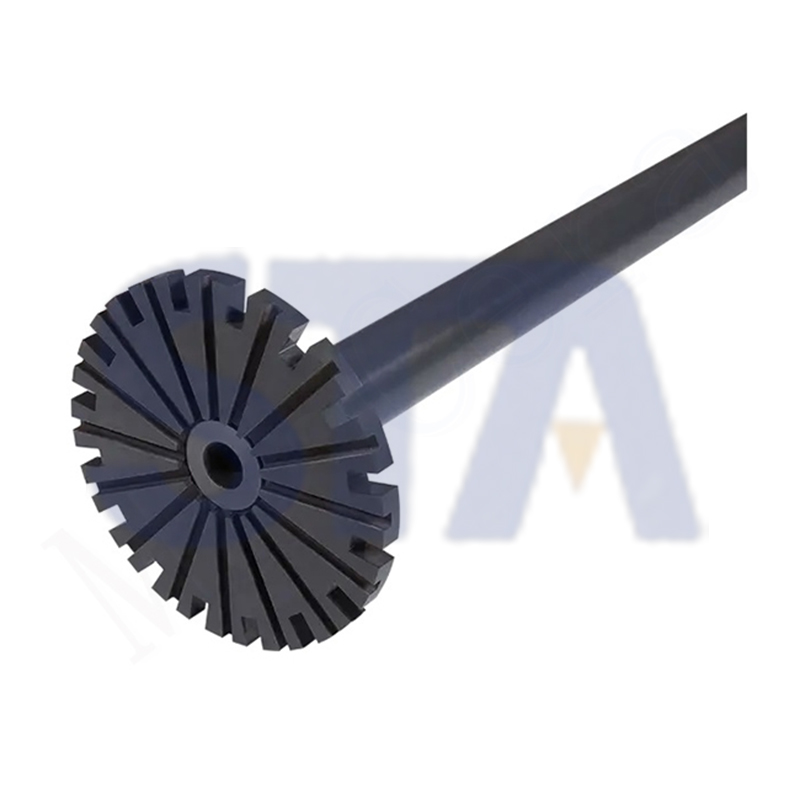STA Silicon Nitride ceramic rotor shaft exhibits exceptional wear and oxidation resistance compared to a graphite rotor. It assures stable high hydrogen removal efficiency for a long service life, and it can reduce the frequency of replacing new parts, so that help customer have good cost savings.
STA Silicon Nitride ceramic rotor shaft exhibits exceptional wear and oxidation resistance compared to a graphite rotor. It assures stable high hydrogen removal efficiency for a long service life, and it can reduce the frequency of replacing new parts, so that help customer have good cost savings. The impeller structure design of rotor shaft, help the gas spreading evenly in the aluminum solution, at the same time, reduce the gas into the solution, prevent the whirlpool shaped. The high gas dispersibility makes hydrogen removal efficiency superior, as a result, improve the quality of die casting parts.

Features
1.Resistance to thermal shock
2.Resistance to corrosion
3.Low- wettability
4.Low heat conduction
5.High strength,long life
Applications
Silicon nitride degassing rotor for purification of aluminum melting melts
Silicon nitride rotor includes impeller and shaft. Used in the aluminum and zinc casting industries, nitrogen, argon or carbon tetrachloride are injected and sprayed into molten metal through silicon nitride rotors for dehydrogenation. It can eliminate the bubbles inside the castings and improve their inner quality. Injects inert gases into the Metallic solution
Silicon nitride rotor is an appropriate product which could be used in depuration to dispose hydrogen of Aluminium melt.
Silicon Nitride Ceramic Properties
Item | Unit | Si3N4 |
Bulk density | g/cm3 | 3.2 |
Water absorption | % | 0 |
Bending strength | Mpa | 750 |
Young modulus | Gpa | 280 |
Fracture toughness | Mpa.m1/2 | 6.5 |
Poisson’s ratio | -- | 0.28 |
Vickers hardness | Gpa | 15 |
Coefficient of linear expansion | x10-6℃ | 3.4 |
Thermal conductivity | W/(m.k) | 26 |
Specific heat | J/(g.k) | 0.65 |
Volume resistivity | ΩNaN | >10^14 |
Heat shock resistance | ℃ | 800 |
Max operation temp. | ℃ | 1150 |
STA Silicon Nitride ceramic rotor shaft exhibits exceptional wear and oxidation resistance compared to a graphite rotor. It assures stable high hydrogen removal efficiency for a long service life, and it can reduce the frequency of replacing new parts, so that help customer have good cost savings. The impeller structure design of rotor shaft, help the gas spreading evenly in the aluminum solution, at the same time, reduce the gas into the solution, prevent the whirlpool shaped. The high gas dispersibility makes hydrogen removal efficiency superior, as a result, improve the quality of die casting parts.

Features
1.Resistance to thermal shock
2.Resistance to corrosion
3.Low- wettability
4.Low heat conduction
5.High strength,long life
Applications
Silicon nitride degassing rotor for purification of aluminum melting melts
Silicon nitride rotor includes impeller and shaft. Used in the aluminum and zinc casting industries, nitrogen, argon or carbon tetrachloride are injected and sprayed into molten metal through silicon nitride rotors for dehydrogenation. It can eliminate the bubbles inside the castings and improve their inner quality. Injects inert gases into the Metallic solution
Silicon nitride rotor is an appropriate product which could be used in depuration to dispose hydrogen of Aluminium melt.
Silicon Nitride Ceramic Properties
Item | Unit | Si3N4 |
Bulk density | g/cm3 | 3.2 |
Water absorption | % | 0 |
Bending strength | Mpa | 750 |
Young modulus | Gpa | 280 |
Fracture toughness | Mpa.m1/2 | 6.5 |
Poisson’s ratio | -- | 0.28 |
Vickers hardness | Gpa | 15 |
Coefficient of linear expansion | x10-6℃ | 3.4 |
Thermal conductivity | W/(m.k) | 26 |
Specific heat | J/(g.k) | 0.65 |
Volume resistivity | ΩNaN | >10^14 |
Heat shock resistance | ℃ | 800 |
Max operation temp. | ℃ | 1150 |
